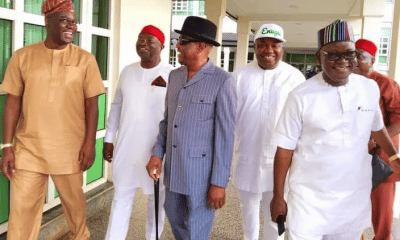Editorial
The Unacceptable Underdevelopment Of Nigerian Youth

That Nigerian youth have important roles to play both directly and indirectly as regards core issues affecting their lives and future cannot be overemphasized.
The Global Youth Development Index released by the Commonwealth Secretariat on Tuesday should have been another wake-up call to the youths of Nigeria to the above fact. Unfortunately, it has slipped from being the needed catalyst to jolt our youth from their usual passivism and indifference.
In the latest triennial ranking of youth development in 181 countries, Nigeria tanked to 161, dropping 20 places from the 141 spot she occupied in 2016! This ordinarily should be a matter of interest to the Nigerian youth for whom the ranking puts a face to their misery. But no, Nigerians within the age group of 15 to 29, who were so depicted, could not be bothered.
In arriving at the index, the Commonwealth Secretariat Youth Division made use of five domains viz: levels of education, health and well-being, employment and opportunity, civic participation and political participation. These domains were ranked between 0.00 (lowest) and 1.00 (highest). It, therefore, means that the average Nigerian youth has been worse off in these parameters.
This newspaper waited to see young Nigerians jump on this woeful outing to demand a better deal from those managing the affairs of the nation, but that didn’t happen. Not even a whimper from the National Youth Council of Nigeria or the National Association of Nigerian Students.
From all indications, the report will go the way of similar disconcerting yet provoking reports about our country. We therefore cannot but ask if being a Nigerian is tantamount to complacency with an anomaly or accepting grim stats which the civilized world expects to jolt us to reality or make us ask questions.
It is possible that most of the affected demographic did not as little as go beyond the headline to click on the story, let alone make it trend online. Yet Nigeria retrogressed by 20 spots even when the Index noted that “the conditions of young people have improved around the world by 3.1 per cent between 2010 and 2018”.
Given the gravity of this ranking which cannot be dissociated from the dire disillusionment of most youth in this country, engaging with the report in terms of comments and shares on social media would have been the least young Nigerians could have done. It was supposed to be an opportunity for the youth to engage with the government on the unacceptable relegation of the welfare and safety of the Nigerian youth.
While this editorial is not meant to incite the people against the government, it only raises a clarion call for the youth of Nigeria to be more alive to their civic responsibility. The youth must not continue majoring in the minor at the expense of the major. Pray, what hope is there for Nigeria if her youth are shortchanged in levels of education, health and well-being, employment and opportunity, civic participation and political participation?
Indeed, these domains are comprehensive enough to be adopted by the government if it is serious about developing the youth. The Ministry of Youth and Sports, therefore, has its job cut for it. Enough of the tokenism that N-Power and other short-term programmes of the government offer. Granted that the government has floated some programmes like the National Youth Investment Fund for the youth, how many young Nigerians are aware or are benefiting from this Fund?
We also wonder why digital technology, which is familiar terrain, is not used to bring more youth on board the policies and programmes which government has for them. Those in authority at all levels must get serious about improving on the lot of the Nigerian youth so that the country can rank better in the next Development Index to be released by the Commonwealth Youth Secretariat.
Howbeit, the youth themselves have a major role to play in their development. Civic participation and political participation domains are squarely their responsibility. They must take advantage of the ongoing Continuous Voter Registration exercise of the Independent National Electoral Commission to do better. Perhaps, through such participation, they may elect politicians who will champion their cause.
We at Naija News strongly believe that Nigeria’s huge population of young people is a blessing rather than an embarrassment. All hands must therefore be on deck to achieve the former and avoid the latter for the good of our country. Enough said!












